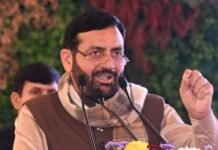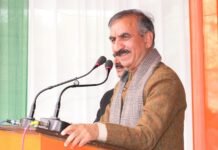In matters of national security, particularly during wartime operations, the sanctity of strategy and the element of surprise are often the very foundation upon which success is built. That is precisely why recent remarks by External Affairs Minister Dr. S. Jaishankar, seemingly indicating that Pakistan was informed at the onset of India’s Operation Sindoor, have erupted into a political and national security firestorm — and rightly so.
This is no ordinary controversy. At the heart of the matter lies an admission — caught on video and now viral — in which Dr. Jaishankar says: “At the start of the operation, we have sent a message to Pakistan, saying we are striking at infrastructure and we are not striking at the military, so the military has an option of standing out and not interfering in this process.” To many, including Leader of Opposition Rahul Gandhi, this is not merely a lapse in protocol, it is a staggering revelation that he claims borders on national betrayal.
The gravity of this issue cannot be overstated. In modern military strategy, especially when targeting cross-border terror infrastructure in a hostile country, strategic ambiguity and the element of surprise are not just tactical choices — they are imperatives. Disclosing operational intent to the adversary risks undermining the entire mission, potentially alerting targets to evacuate, enabling defensive posturing, or worse, leading to counterattacks. If Pakistan’s military or its affiliated terror groups were indeed forewarned, it could have directly compromised the success of the strikes, endangered pilots, or allowed high-value targets like Masood Azhar or Hafiz Saeed to escape.
Rahul Gandhi, amplifying the concern, described this not as a “lapse” but a “crime,” questioning the political authority behind the decision and demanding accountability. “Who authorised this communication? How many aircraft did we lose because Pakistan was informed?” he asked. His insistence that “the nation deserves the truth” has struck a chord among many, cutting across political lines.

In damage control mode, the Ministry of External Affairs and the BJP have pushed back, accusing Gandhi of misrepresenting Jaishankar’s words and peddling “deceptive information.” They maintain that the message to Pakistan was delivered after the operation commenced — not before. But this rebuttal has done little to quell the disquiet, as the video clip itself shows Jaishankar referring to “the start of the operation” — a phrase open to interpretation but nonetheless concerning in the context of high-stakes warfare.
The Defence Ministry has leaned on the remarks of Lieutenant General Rajiv Ghai, DGMO, who clarified during the post-operation briefing that India attempted to “reach out” to the Pakistani side in the “immediate wake” of the strikes, not before them. Yet, the optics remain awkward. In a world where perception shapes reality, even the ambiguity of timing — before or during the strikes — casts a shadow over the credibility of India’s strategic operations and opens the door to both domestic and international criticism.
This controversy also arrives at a politically delicate time. With the world watching India’s counter-terror posture closely, especially in light of Operation Sindoor’s bold strikes on terror hubs in Muridke and Bahawalpur, the allegation that Pakistan may have received a pre-emptive signal from India undermines both military morale and diplomatic messaging. It also threatens to shift the spotlight from India’s surgical precision to questions about strategic softness.
Critics argue that if India indeed sought to signal its intentions to Pakistan, even under the garb of de-escalation or to limit military casualties, it undermines the logic of retaliatory deterrence. More importantly, it grants plausible escape to key targets — a luxury that no modern military can afford in the fight against transnational terrorism.
In the fog of war, information is a weapon. Miscommunication, whether internal or public, can alter the course of strategic credibility. If there is even a shred of truth to Gandhi’s charge — that Pakistan was informed before Indian jets were in the air — then it is not merely a political misstep, but a case study in how blurred lines between diplomacy and warfare can create serious national security liabilities.
The government, so far, has failed to offer a clear timeline or irrefutable clarification on this sensitive issue. The questions raised are not simply political barbs; they are strategic imperatives for a democracy that values transparency, accountability, and above all, the sanctity of its armed forces’ sacrifices.
In a time when India is asserting its place as a regional security force, ambiguity of this nature undermines the precision and decisiveness that should define its counter-terror efforts. More than a political controversy, this is a test of how seriously India values strategic integrity — both in execution and in communication.
#JaishankarControversy #OperationSindoor #RahulGandhi #IndiaPakistanTensions #AirStrikeDebate #MEAunderFire #NationalSecurityIndia #TerrorStrikePolicy #IndiaFirst
This is an auto web generated news web story.




